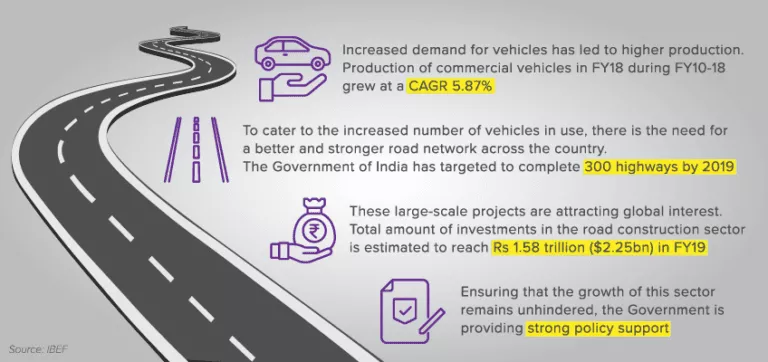With a land mass spanning 3.287 million sq. km. and a significantly varied topography, it is inevitable that India has the one of largest road networks in the world. This network, comprising of highways and internal connecting roads, supports the transportation of 64.5% of goods’ logistics and about 90% of passenger commute.
Additionally, the continued development of Tier 2 and Tier 3 cities as well as the creation of satellite cities and smart cities has resulted in a commendable increase in road construction projects. The scale and nature of these projects has also been influenced by the significant rise in Indian consumers’ acquisitions of new vehicles with better technologies and world-class standards.
Aimed at providing the necessary infrastructure support to inter-city trade and catering to the rising number of vehicles (commercial and non-commercial), road construction projects have rightfully taken a priority in the Government’s mandate of furthering the country’s economic growth.
Initiatives with Drive and Direction
In 2018 alone, there have been huge developments in the projects dedicated to the road construction sector. To elaborate, some of the key initiatives implemented this year are:
- Proposal of road construction projects totaling to 34,800 km under Phase 1 of Bharatmala Pariyojana
- Approval of highway projects estimated at Rs. 2 billion (USD 29.83 million) to improve connectivity between Maharashtra, Gujarat, Rajasthan, Madhya Pradesh and Diu
- Sanction of USD 500 million by the World Bank as additional funding for the construction of 7,000 km long climate-resilient roads
- Proposal to construct 3,500 km. of the climate-resilient roads using green technologies under the Pradhan Mantri Gram Sadak Yojna (PMGSY)
- Approval to construct a 10 km. long 6-lane bridge, estimated at Rs 2000 crore (USD 302.29 million), by 2021 across the Ganga river
- Sanction of USD 210 million by the World Bank for the development of 10,000 km of rural roads in Madhya Pradesh under PMGSY
With the approvals of these much-needed infrastructure betterment projects as well as some critical financial sanctions, the sector’s advancement in 2018 is a clear indicator of the scope for growth and development in the years to come.
The Road Ahead
It is common knowledge that the Indian economy is one of the fastest growing economies in the world. To sustain this development as well as prepare for the future needs of the country, the Government has also envisioned some of the world’s largest infrastructure projects for the next few years.
Although enlisting all the projects and the opportunity each of them presents would be too extensive, the potential of these opportunities can be assessed basis some key aspects of the plan:
- 200,000 km. of national highways are expected to be completed by 2022
- Target of FY-19 is to award 15,000 km. of projects and construct 10,000 of national highways
- FY19 will also see the completion of approximately 300 major projects including roads and bridges
- Rs 7 trillion (USD 107.82 billion) will be invested over the next 5 years by the Central Government in the construction of new roads and highways
To accomplish such large projects, the Government is also working to encourage investments from the private sector. And to do so, there have been proactive efforts by the administration to introduce strategies and initiatives that not only help global companies easily enter the Indian business ecosystem, but also balance their profitability with project execution.
India’s recent rise in The World Bank’s Ease-Of-Doing-Business rankings and the implementation of 100% FDI in this sector, are testament to this.
The increasing interest and participation of global businesses in varying aspects of these road construction and infrastructure projects also reflect the international appreciation and recognition of these projects.
Given that there is a significant amount of work proposed, there exists a huge opportunity for new businesses from around the world to bring their technical expertise to India through the projects. These projects are awarded and undertaken either as EPC (Engineering Procurement Construction) contracts or as PPP (Public Private Partnership) contracts. Identifying a project and associating with it by taking a bid forward must consequently depend not only on the project itself but also on the business’s long-term interest in the Indian market.
While the present Government has already committed a significant amount of resources to the development of road construction projects, the elections of 2019 additionally present an opportunity for the contenders to further the ongoing development of the road and infrastructure sector.
—
Written by Shõan Shinde
Heading the Marketing function at Coinmen Consultants LLP, Shõan helps global businesses connect with the firm to explore new opportunities in India’s infrastructure sector.
Note: Views presented in the article are of the author and not the firm.











